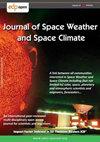Growin: Modeling Ionospheric Instability Growth Rates
IF 2.7
2区 物理与天体物理
Q2 ASTRONOMY & ASTROPHYSICS
引用次数: 4
Abstract
Seasonal and zonal climatologies of Rayleigh-Taylor growth rates under geomagnetically quiet conditions during solar minimum and solar moderate conditions as a function of local time and altitude are calculated using open source data and software. It is under the action of the Rayleigh-Taylor instability that plumes of depleted plasma, or plasma bubbles, are understood to develop in the bottomside of the equatorial ionosphere. The growin python module utilizes other Heliophysics python modules to collate and process vertical plasma drift to drive the SAMI2 is Another Model of the Ionosphere (SAMI2) model and subsequently calculate the flux tube integrated Rayleigh-Taylor growth rate. The process is repeated for two different types of drift inputs: the Fejer-Scherliess model and measured drifts from the Communication/Navigation Outage Forecasting System (C/NOFS). These growth rates are compared to bubble occurrence frequencies obtained from a dataset of bubbles detected by the C/NOFS satellite. There is agreement between periods of strong positive instability growth and high frequencies of bubble occurrence in both low and moderate solar activity conditions when using C/NOFS drifts. Fejer-Scherliess drifts are only in agreement with bubble occurrence frequencies during moderate solar activity conditions. Bubble occurrence frequencies are often above 25% even when growth rates in the bottomside F region are negative. The climatological nature of the growth rates discussed here begs further study into the day-to-day variability of the growth rate and its drivers.增长:模拟电离层不稳定性增长率
使用开源数据和软件计算了在太阳活动极小期和太阳活动中等条件下地磁平静条件下瑞利-泰勒增长率随当地时间和海拔高度变化的季节性和带状气候学。据了解,正是在瑞利-泰勒不稳定性的作用下,耗尽等离子体羽流或等离子体气泡在赤道电离层的底部形成。growin-python模块利用其他太阳物理python模块来整理和处理垂直等离子体漂移,以驱动SAMI2是电离层的另一个模型(SAMI2)模型,并随后计算通量管积分瑞利-泰勒增长率。对两种不同类型的漂移输入重复该过程:Fejer-Scherliess模型和通信/导航中断预测系统(C/NOFS)的测量漂移。将这些增长率与C/NOFS卫星探测到的气泡数据集中获得的气泡发生频率进行比较。当使用C/NOFS漂移时,在低和中等太阳活动条件下,强正不稳定性增长期和气泡出现的高频率之间存在一致性。Fejer-Scherliess漂移仅与中等太阳活动条件下的气泡发生频率一致。即使底部F区域的增长率为负,气泡的发生频率也通常在25%以上。这里讨论的增长率的气候性质需要进一步研究增长率的日常变化及其驱动因素。
本文章由计算机程序翻译,如有差异,请以英文原文为准。
求助全文
约1分钟内获得全文
求助全文
来源期刊

Journal of Space Weather and Space Climate
ASTRONOMY & ASTROPHYSICS-GEOCHEMISTRY & GEOPHYSICS
CiteScore
6.90
自引率
6.10%
发文量
40
审稿时长
8 weeks
期刊介绍:
The Journal of Space Weather and Space Climate (SWSC) is an international multi-disciplinary and interdisciplinary peer-reviewed open access journal which publishes papers on all aspects of space weather and space climate from a broad range of scientific and technical fields including solar physics, space plasma physics, aeronomy, planetology, radio science, geophysics, biology, medicine, astronautics, aeronautics, electrical engineering, meteorology, climatology, mathematics, economy, informatics.
 求助内容:
求助内容: 应助结果提醒方式:
应助结果提醒方式:


